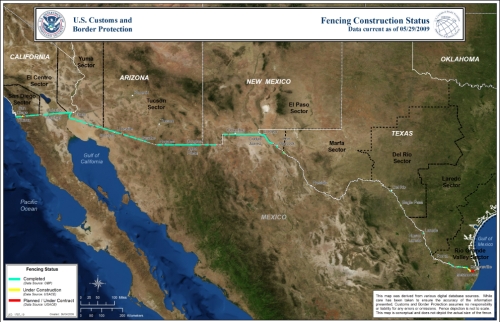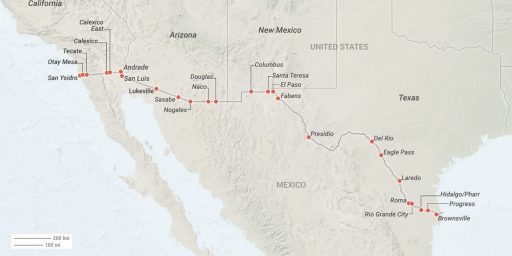Six Observations on Immigration Reform
Some points on the immigration debate that need constant (it seems) reinforcement.
 None of this is new, but every time I read or hear a discussion on immigration reform, I feel the need to point these things out:
None of this is new, but every time I read or hear a discussion on immigration reform, I feel the need to point these things out:
1. This is a Permanent Issue. No immigration policy will solve the problem once and for all. I read people make assertions about enforcing the law or border security in particular (but also form proponents of reform) who speak as if there is a way to end the issue of undocumented persons being in the country or that it is possible to find a means by which to stop all illegal entries. This is nonsense. The goal shouldn’t be solving the issue once and for all (the only way to do that, by the way, is to eliminate borders and citizenship altogether), but rather the goal should be to figure out how to manage the fact that human beings are going to move around.
Indeed, I would suggest that some need to readjust their thinking about what policy ought to look like. If one thinks that there is a way to solve, once and for all, the issue, I would submit that that individual doesn’t understand the issue nor the way public policy works.
2. Visa Over-stayers. Roughly half of undocumented immigrants in the US did not cross the border illegally. They entered with visas and did not leave when they were supposed to. Regardless of what one thinks of these persons and what should be done to them, this fact underscores something rather important: the “danged fence” will not solve this issue. The fact that many anti-reform types focus on the border itself and often seem oblivious to visa over-stayers underscores that they don’t understand even the basics of this debate.
3. Secure Borders=More Over-stayers. One element of the policy debate that many anti-reformer miss is that the more secure the border is (i.e., crossing is made more difficult), the more likely that undocumented immigrants are to stay once in the US. (I discussed this phenomenon in a post about a year ago).
4. Enforce über alles. The mantra that we would solve the problems if we just “enforce current laws” and that we don’t need new laws misses a rather fundamental fact: the current laws are not working. The system is profoundly broken. When a system is profoundly broken, logic dictates that a new system is needed, not doubling down on the broken system.
Some will retort, no doubt, that we are not even trying to enforce all the laws. Perhaps this is true, but this is because of a combination of a) the impossibility of enforcing all the laws, and b) the fact that the current laws are not adequate to deal with the scope of the problem.
5. The Rule of Law! A corollary to point number four is that all anti-reform types want to do is adhere to “rule of law” as if current laws are sacrosanct. However, this position rather ignores that the current laws are not the laws we have always had on this subject and, moreover, laws can be changed.
6. Human Beings. Too much of this debate (at least from the anti-reform side) ignores that ultimately we are talking about human beings who live regular lives (have jobs, pay taxes, have kids, etc.).





7. We have two Borders!
Stop acting like the US has one land border. If you are truly concerned with border security, it means everywhere, not just along the Rio Grande. A lot of accusations of racism come from the fact that you don’t hear one peep about building a fence to keep Canada out. There have been several documented cases of wanted terrorists, drug dealers, and criminals sneaking across the northern border as well as your typical illegal immigrant. It’s very telling that when you say “border”, people automatically think Texas, not Maine.
Of course, when you have communities that buildings like this instead of empty desert, it becomes a lot harder to justify walling off the nation. People would be less tolerant of that sort of thing.
@KM: A worthwhile addition to the list (not to mention we have sea borders and airports).
8. The Fence Won’t Work Without a Level of Force We Might Not Be Comfortable With
A fence is ultimately nothing but a surmountable obstacle. You can go around, over or under it with effort. So…. what do we do to those trying to get past the fence? Politely tell them to stop? Push the ladder over while people are on it? Electrify it? Are we ready as a nation for what we would need to do to keep people away? We need to talk about how comfortable we are as a nation with what level of force you are allowed to stop those crossing.
The reason the Berlin Wall kept people in? There was a kill zone around it. You got close to the wall, you died – plain and simple. As history will tell you, a wall is only as good as it’s patrol and what they can do to the challengers. Castles didn’t build walls and ignore them – they needed to be manned with people ready to kill in order to stop an intruder. Any smart, determined group can and will circumvent the fence unless there is a heavy force behind it to deter them. People think the wall will just stop things with no further follow-up – watch Pacific Rim for how well that idea works, even in fiction.
@ Steven:
Thanks. It’s a pet peeve of mine. I live near the Northern border and have family that works on the bridges. The stories I hear make me think we do need to work on our security efforts but in a sane manner – not wall us off from the world. Honestly, do people realize they’re not talking about walling Mexico off but walling America in? Very Edgar Allan Poe…..
@KM:
This is a glaring one for me. Anyone who sees government excess as a threat, which should be all of us, should shudder at what it would take to make this kind of enforcement happen. I think Children of Men, minus the executions and stuff.
@KM:
Well, there’s this…
(Which is probably just as realistic as the “BUILD FENCE NOW” crowd’s hopes…)
@Steven L. Taylor:
Professor, I appreciate your calm, logical analysis…. but you do know you’re entering a dialogue with commenters who refer to immigrants as “vermin, ” “cockroaches”, and who explain that the immigrant men defile white women with brown babies who inevitably grow up speaking Spanish? I don’t think these guys are going to appreciate the finer points of your analysis here.
I think it is this fear of whites being overwhelmed by the brown horde is the biggest obstacle to immigrant reform , and I’m not sure how logical analysis fixes that.
@stonetools: Those folks unpersuadable, to be sure. There are, however, some who are focused on simplistic narratives about “rule of law” and whatnot.
There are many times I do wonder if it is possible to have a reasoned discourse on policy, but ultimately come down on the side that it is better to try lest I become a raving loon myself.
Nothing, short of actually penalizing employers who hire illegal immigrants and discovering that it doesn’t work, will convince me that it won’t work. Going after the illegal immigrants themselves doesn’t work (we’ve tried, and more come to take the place of the ones deported, like some kind of offensive insect swarm metaphor), but we have never seriously tried going after the employers.
We have laws on the books that we don’t enforce — and we don’t even have the infrastructure in place to enforce them.
@Gustopher: Yes, but even those observation indicate the need for reform (e.g., if there is inadequate infrastructure for enforcement that means that focusing on enforcement is a dead end street).
@Gustopher:
How is an employer supposed to determine who is an illegal immigrant?
You should add that over 100 million third world residents have stated that they want to come to the U.S. and not a single immigration proposal states how many of them should be allowed. If the current comprehensive immigraiton reform bill is passed with its increase to 2 million legal immigrants each year, that still leaves 98 million others who want to come to U.S. but cannot legally do it.
The only question for the future is how many people should be allowed to immigrate to the U.S. each year and how to make that number work. Too many progressives, excited about the idea of creating a one party state with a patron-peon culture, want to allow all 100 million come to the U.S. Then the question become how soon will the U.S. have the same quality of life as Mexico, the Phillipines, or Nigeria?